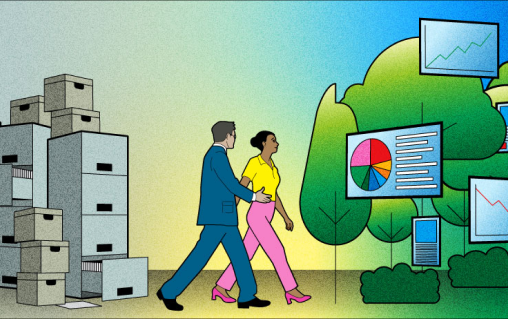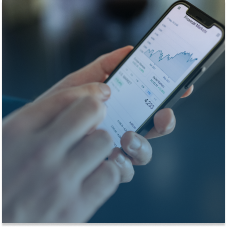7 ways digital transformation can help your business
The digital revolution is well underway in financial planning offices across the country, and while there are still remnants of the analog world, the workplace is increasingly dominated by screens, tablets, smartphones, and widespread use of electronic forms and documents.
This has been particularly evident over the last few years as the pandemic pushed people not just to work remotely, but to embrace technology in all aspects of their business lives. Whether it was through the adoption of customer relationship management (CRM) software, the routine use of remote conference tools, or planning software such as Asset-Map, it’s clear that tech has changed the game forever.
The options—and the will to experiment with them—were suddenly endless. Financial professionals who had postponed the digital transformation of their offices realized that whether they were competing for clients or competing for talent, they had no choice but to do what so many other financial professionals were already doing: go digital. As Jim Eckel, founder and president of the online directory FinancialAdvisors.com, wrote in his company’s blog, “Being agile, flexible, and smart with digital is the key to success right now.”
Good for your clients, good for the environment
There are many reasons that Eckel’s words are ringing true. Among them:
Cost and efficiency savings: For financial professionals and their clients, converting to digital makes it easy to discuss finances and saves time in terms of data entry, filing, research, and providing materials.
Growing the customer base: Derek N.H. Notman, CFP and founder of Intrepid Wealth Partners in Madison, Wisconsin, notes that millennial and Gen Z clients want to be able to work digitally with their financial planners. “Digital is the preferred way to attract the younger generation,” Notman says. “They are online, they grew up online, they search for products and services online.” Savvy financial professionals can further demonstrate their digital chops by creating targeted website content and online blogs.
Updating plans: Using financial software, plans can be made easily, and adjustments accommodated quickly, as circumstances or considerations change.
Increased efficiency: “Things like marketing, account opening, data gathering, and filing are all important,” Notman concedes, “but they’re not what financial professionals are paid to do. The more we can automate, the more productive we will be, and the better we’ll serve our clients.”
Improved customer experience: One way to achieve better client service through digitalization is by providing 24/7 access to easy-to-use dashboards and real-time updates—something that is not only important to existing clients, but to those clients you’re trying to attract. “Smart forms and data collection can make the onboarding process more manageable,” wrote Eckel. “With the right tools, you can personalize outreach and target the right clients.”
The power of data: Moxo, a company that provides customer portals, notes that “data analytics can empower smarter decision making and automate routine processes.” This is partially because of the auditable trail of data left by every digital interaction. “By capturing the location, device, and time for every interaction that takes place through your client portal,” Moxo says, “you can pinpoint issues faster, prioritize response time, and reveal opportunities for improvement.”
The environmental impact: Being environmentally responsible by restricting the use of paper resonates with many clients. To reinforce its own environmental commitment, Global Atlantic Financial Group is working with the National Forest Foundation and providing financial professionals who sell Global Atlantic products with a chance to help restore trees in fire-damaged areas. Through this program, for which Global Atlantic has committed up to $500,000 through 2025, every time a Global Atlantic policy holder signs up for e-statements in lieu of receiving paper documents, Global Atlantic will make a donation of $2.00 to NFF. One dollar will plant a tree in a post-fire reforestation project, and the other dollar will be used to help safeguard forests from unnaturally large wildfire risks through resiliency programs.
Start transforming your office
The evidence is compelling. But how do you embark upon your digital journey? Derek Notman and others suggest a series of steps:
If you’re just getting started:
- Figure out why you’re doing this
- Clarify the motivating factors that will help you, as a financial professional, help your clients go digital.
- Evaluate your physical and digital infrastructure: what will your office look like? What type of computers and webcams will you be using? What type of software will you need?
When you’re on your way:
- Ensure that security is top of mind—from the start. “Security and privacy can’t be tacked on later,” says Moxo. “Every client interaction and digital workspace must be secure and auditable.”
- Focus on creating content that is education-based and to educate current clients but also to attract prospects.
- Develop a strong advice/sales process that you can use with new clients remotely or in-person.
- Realize that this transition will take time and that it’s ok if it doesn’t happen overnight.
When you’re nearly there:
- Once you have your basic processes and systems in place, scale them.
- Put more time and energy into social and digital marketing strategies, including e-books, webinars, and email nurturing campaigns.
And remember, you’ll never be done. As Notman stresses, “digitalization is a journey, not a one-time effort. Technology—just like client preferences and habits—is constantly evolving.”
Share
Related resources
More on Practice Management
Your Thriving
Practice
A destination to empower financial professionals to build, manage, and grow their practice
Get started with Global Atlantic
Take the next step with a company that can help elevate your business.
Need help?
Find all the contact information to submit and service your business.











